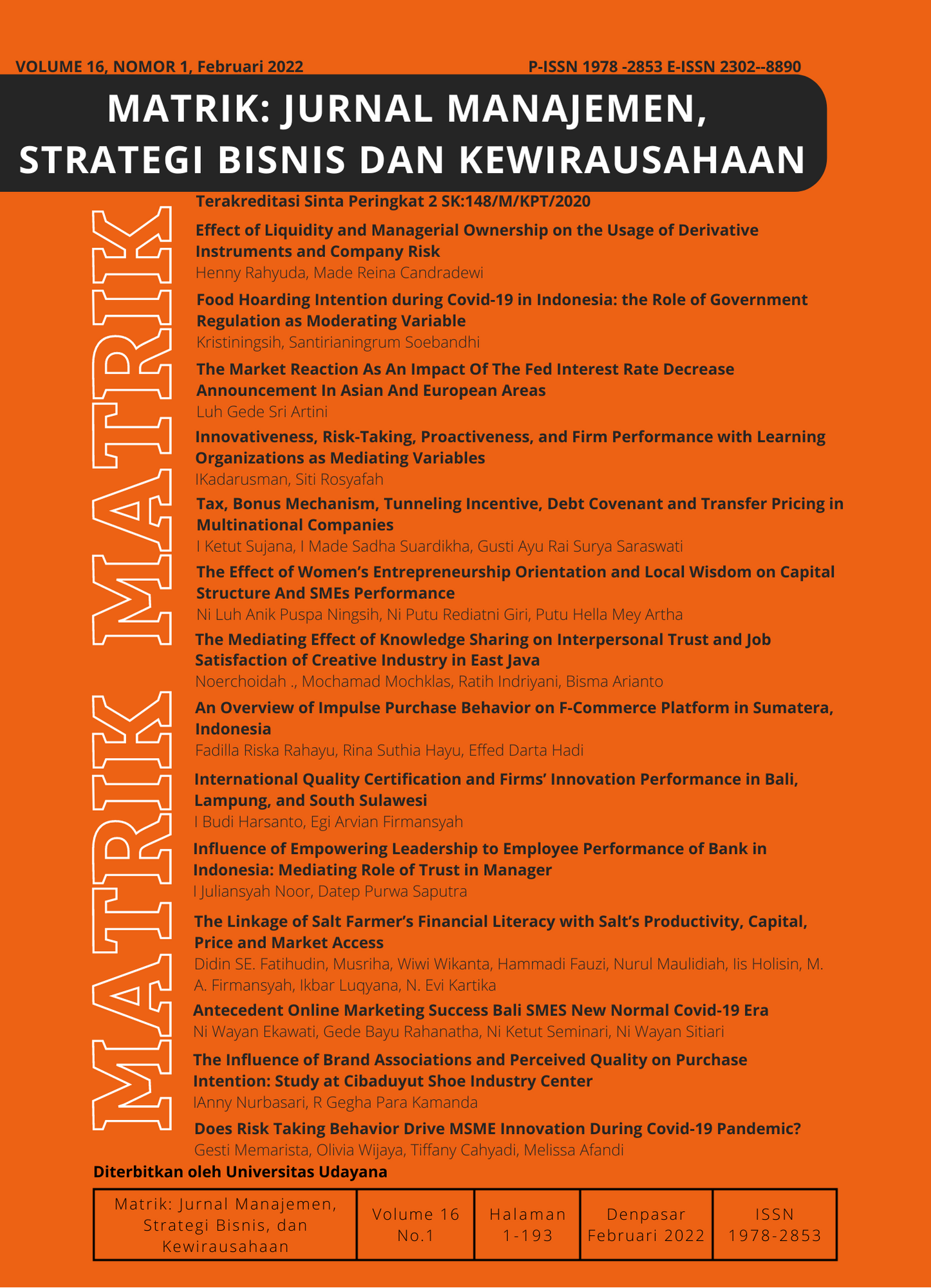International Quality Certification and Firms’ Innovation Performance in Bali, Lampung, and South Sulawesi
Abstract
Tujuan dari studi ini adalah untuk menganalisa perbedaan antara performa inovasi perusahaan yang memiliki dan tidak memiliki sertifikasi kualitas internasional di Bali, Lampung, dan Sulawesi Selatan. Ketiganya adalah tiga provinsi di luar pulau Jawa yang tercakup dalam Enterprise Survey gelombang terakhir di Indonesia (Bank Dunia, 2015). Ada 288 perusahaan di tiga provinsi tersebut yang menjadi partisipan dalam survey. Data hasil survey dianalisa menggunakan statistik deskriptif, uji chi-square (dengan Yates’ continuity correction dan Fisher’s Exact Test) serta uji Mann-Whitney U. Hasil analisa menunjukkan bahwa hanya 9,7 persen perusahaan memiliki sertifikasi kualitas internasional sebagai cerminan standar kualitas mereka. Uji chi-square memperlihatkan bahwa perbedaan signifikan tampak pada tipe inovasi proses dan organisasi, sementara inovasi produk tidak signifikan. Bila dihubungkan dengan kendala, uji Mann-Whitney mengungkapkan bahwa kendala-kendala yang dihadapi perusahaan dengan dan tanpa sertifikasi tidak signifikan secara statistik. Berbeda dengan studi terdahulu yang dominan menganalisa dampak sertifikasi terhadap performa operasional, penjualan, atau finansial, studi ini memberikan fokus kepada performa inovasi dengan data empiris unik berkonteks tiga provinsi di Indonesia yang berlokasi di luar pulau Jawa.
Downloads
References
Ali, J., & Yusuf, N. (2019). International Quality Certification and Business Performance of Indian Firms: Evidence from Enterprise Survey Data. Global Business Review. https://doi.org/10.1177/0972150919825514
Astrini, N. (2018). ISO 9001 and performance: a method review. Total Quality Management & Business Excellence, 32(1–2), 5–32. https://doi.org/10.1080/14783363.2018.1524293
Azis, Y., Darun, M. R., Kartini, D., Bernik, M., & Harsanto, B. (2017). A model of managing innovation of SMEs in Indonesia Creative Industries. International Journal of Business and Society, 18(35), 391–408. https://www.semanticscholar.org/paper/A-model-of-managing-innovation-of-SMEs-in-creative-Azis-Ridzuan/a60895aba2002ca39fa05c8f6f2f47bfcd4c8a13
Bourke, J., & Roper, S. (2017). Innovation, quality management and learning: Short-term and longer-term effects. Research Policy, 46(8), 1505–1518. https://doi.org/10.1016/j.respol.2017.07.005
Clougherty, J. A., & Grajek, M. (2014). International standards and international trade: Empirical evidence from ISO 9000 diffusion. International Journal of Industrial Organization, 36, 70–82. https://doi.org/https://doi.org/10.1016/j.ijindorg.2013.07.005
Galetto, M., Franceschini, F., & Mastrogiacomo, L. (2017). ISO 9001 certification and corporate performance of Italian companies. International Journal of Quality & Reliability Management, 34(2), 231–250. https://doi.org/https://doi.org/10.1108/IJQRM-04-2015-0064
Guo, Y., Jong, A. P. L., & Yeung, A. C. L. (2018). Quality management and international trade: institutionalization of quality standards and performance outcomes in China. Journal of Shipping and Trade, 3(1), 1–10. https://doi.org/10.1186/s41072-018-0034-1
Harsanto, B. (2009). Aplikasi Quality Function Deployment pada Kereta Api Argo Wilis. Jurnal Bisnis Dan Manajemen, 3(1).
Harsanto, B. (2013). Dasar Ilmu Manajemen operasi. Unpad Press.
Hartono. (2015). Statistik Untuk Penelitian (7th ed.). Zanafa.
Heras, I., Dick, G. P. M., & Casadesus, M. (2002). ISO 9000 registration’s impact on sales and profitability: a longitudinal analysis of performance before and after accreditation. International Journal of Quality & Reliability Management, 19(6), 774–791. https://doi.org/https://doi.org/10.1108/02656710210429618
Ilyasa, M. A. R., Bernik, M., & Harsanto, B. (2016). Implementation of Six Sigma Method in Small and Medium Enterprises (SMEs)(Case Study on CV. Berkah Abadi). Jurnal Bisnis Dan Manajemen, 17(1), 1–12. https://doi.org/http://dx.doi.org/10.24198/jbm.v17i1.4
Islam, D. M. Z., & Zunder, T. H. (2014). The necessity for a new quality standard for freight transport and logistics in Europe. European Transport Research Review, 6(4), 397–410. https://doi.org/https://doi.org/10.1007/s12544-014-0141-5
Kafetzopoulos, D., Gotzamani, K., & Psomas, E. (2013). Quality systems and competitive performance of food companies. Benchmarking: An International Journal, 20(4), 463–483. https://doi.org/https://doi.org/10.1108/BIJ-08-2011-0065
Kumar, D. A., & Balakrishnan, V. (2011). A study on ISO 9001 Quality Management System Certifications –Reasons behind the failure of ISO certified Organizations. Global Journal of Management and Business Research, 11(9).
Lakhal, L. (2009). Impact of quality on competitive advantage and organizational performance. Journal of the Operational Research Society, 60(5), 637–645. https://doi.org/10.1057/palgrave.jors.2602601
Lakhal, Lassaad. (2017). The relationship between ISO 9000 certification, TQM practices, and organizational performance. Quality Management Journal, 21(3), 38–48. https://doi.org/https://doi.org/10.1080/10686967.2014.11918395
Lakhal, Lassâad, & Pasin, F. (2008). The direct and indirect impact of product quality on financial performance: A causal model. Total Quality Management & Business Excellence, 19(10), 1087–1099. https://doi.org/https://doi.org/10.1080/14783360802264293
Manders, B., De Vries, H. J., & Blind, K. (2016). ISO 9001 and product innovation: A literature review and research framework. Technovation, 48–49, 41–55. https://doi.org/10.1016/j.technovation.2015.11.004
Mangiarotti, G., & AF Riillo, C. (2014). Standards and innovation in manufacturing and services: the case of ISO 9000. International Journal of Quality & Reliability Management, 31(4), 435–454. https://doi.org/https://doi.org/10.1108/IJQRM-06-2012-0077
Martínez-Costa, M., & Martínez-Lorente, A. R. (2008). Does quality management foster or hinder innovation? An empirical study of Spanish companies. Total Quality Management, 19(3), 209–221. https://doi.org/https://doi.org/10.1080/14783360701600639
Pallant, J. (2011). SPSS Survival Manual. Open University Press.
Prayudha, A. N., & Harsanto, B. (2014). Measuring service quality in Hotel X Bandung. ISTMET 2014 - 1st International Symposium on Technology Management and Emerging Technologies, Proceedings, Istmet, 230–234. https://doi.org/10.1109/ISTMET.2014.6936511
Putri, N. K. N., & Yasa, N. N. K. (2018). Peran Inovasi Produk Memediasi Orientasi Pasar Terhadap Kinerja Pemasaran (Studi pada Usaha Mikro, Kecil dan Menengah Pie Susu di Kota Denpasar). Matrik : Jurnal Manajemen, Strategi Bisnis Dan Kewirausahaan, 12(2), 111. https://doi.org/10.24843/matrik:jmbk.2018.v12.i02.p03
Ratnasingam, J., Yoon, C. Y., & Ioras, F. (2013). The effects of ISO 9001 quality management system on innovation and management capacities in the Malaysian furniture sector. Bulletin of the Transilvania University of Brasov. Series II: Forestry, Wood Industry, Agricultural Food Engineering., 6(1), 63–70. https://library.iso.org/contents/data/105-the-effects-of-iso-9001-qual.html
Sadikoglu, E., & Olcay, H. (2014). The effects of total quality management practices on performance and the reasons of and the barriers to TQM practices in Turkey. Advances in Decision Sciences, 2014, 1–17. https://doi.org/http://dx.doi.org/10.1155/2014/537605
Terziovski, M., & Guerrero, J. L. (2014). ISO 9000 quality system certification and its impact on product and process innovation performance. International Journal of Production Economics, 158, 197–207. https://doi.org/10.1016/j.ijpe.2014.08.011
The World Bank. (2015). Enterprise Surveys Indonesia. Enterprise Surveys.
Tsekouras, K., Dimara, E., & Skuras, D. (2002). Adoption of a quality assurance scheme and its effect on firm performance: a study of Greek firms implementing ISO 9000. Total Quality Management, 13(6), 827–841. https://doi.org/https://doi.org/10.1080/0954412022000010163
Wang, Q., Zhao, X., & Voss, C. (2016). Customer orientation and innovation: A comparative study of manufacturing and service firms. International Journal of Production Economics, 171, 221–230. https://doi.org/10.1016/j.ijpe.2015.08.029
Wiengarten, F., & Pagell, M. (2012). The importance of quality management for the success of environmental management initiatives. International Journal of Production Economics, 140(1), 407–415. https://doi.org/https://doi.org/10.1016/j.ijpe.2012.06.024
 This work is licensed under a Creative Commons Attribution-ShareAlike 4.0 International License.
This work is licensed under a Creative Commons Attribution-ShareAlike 4.0 International License.

















